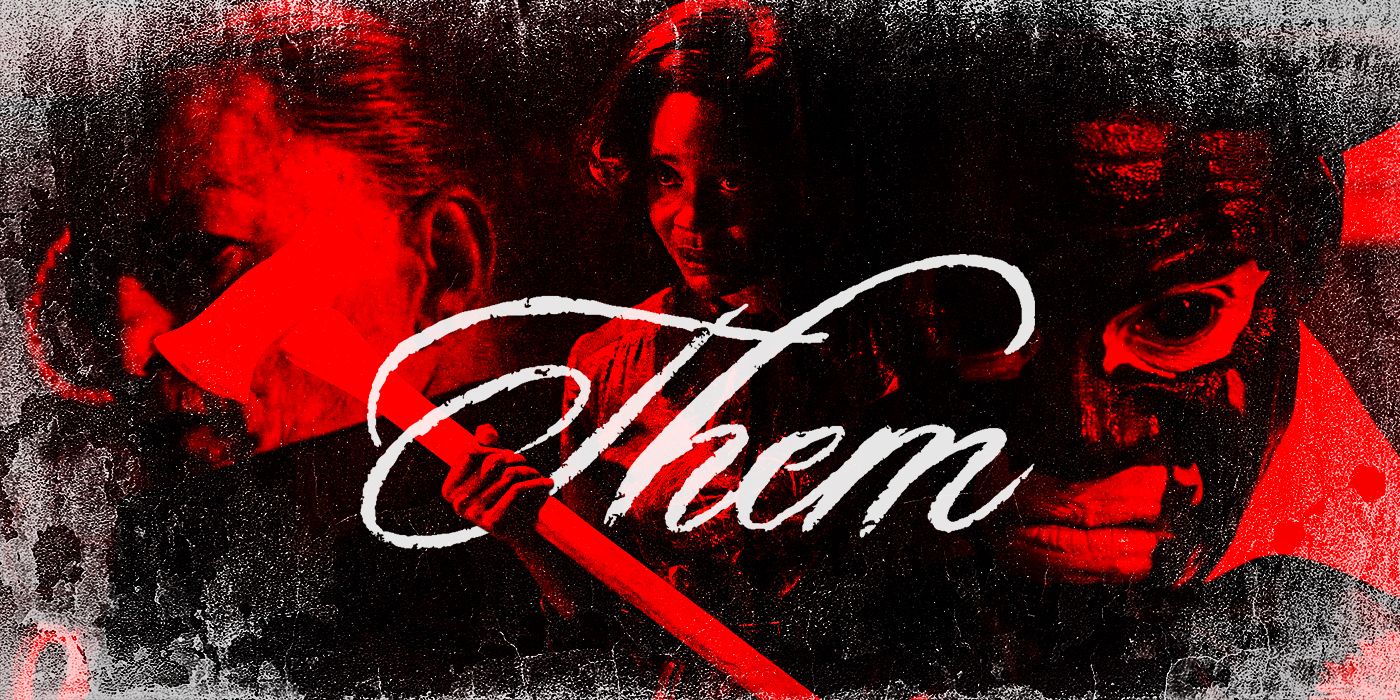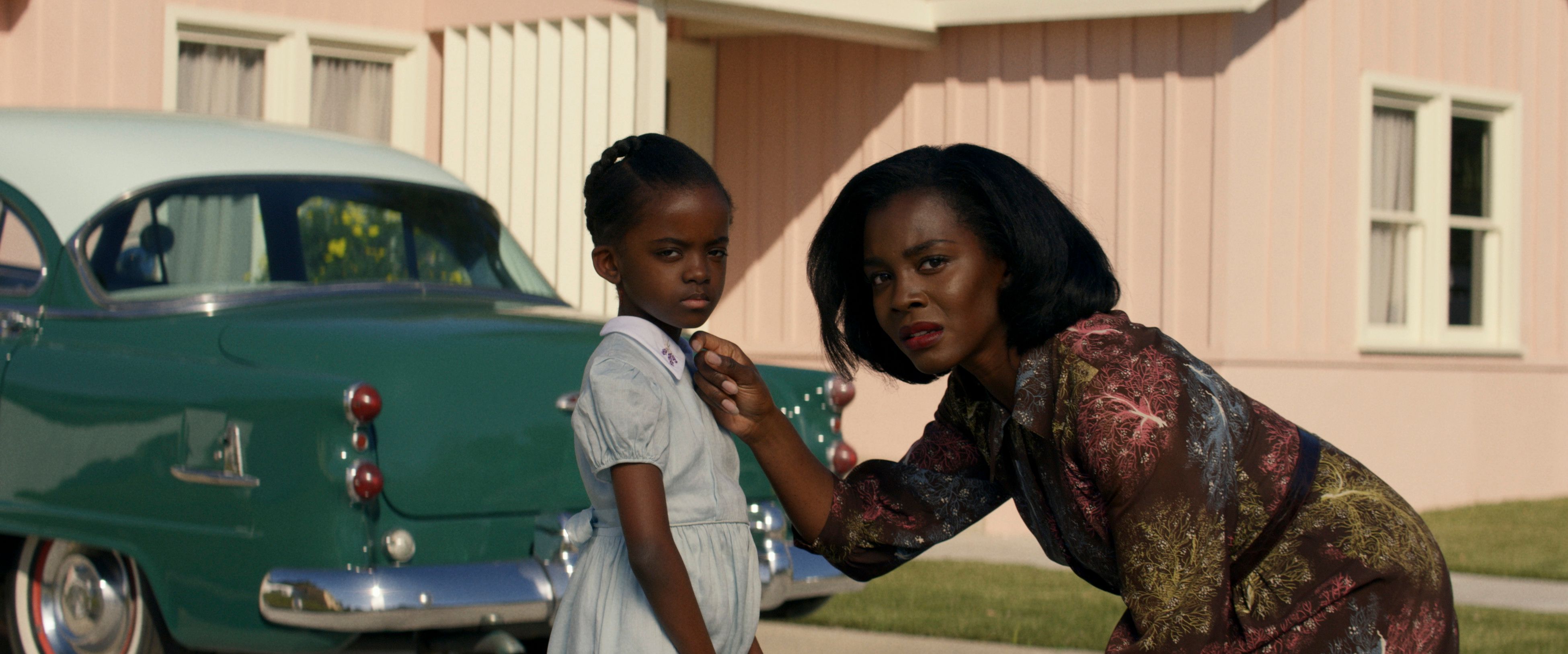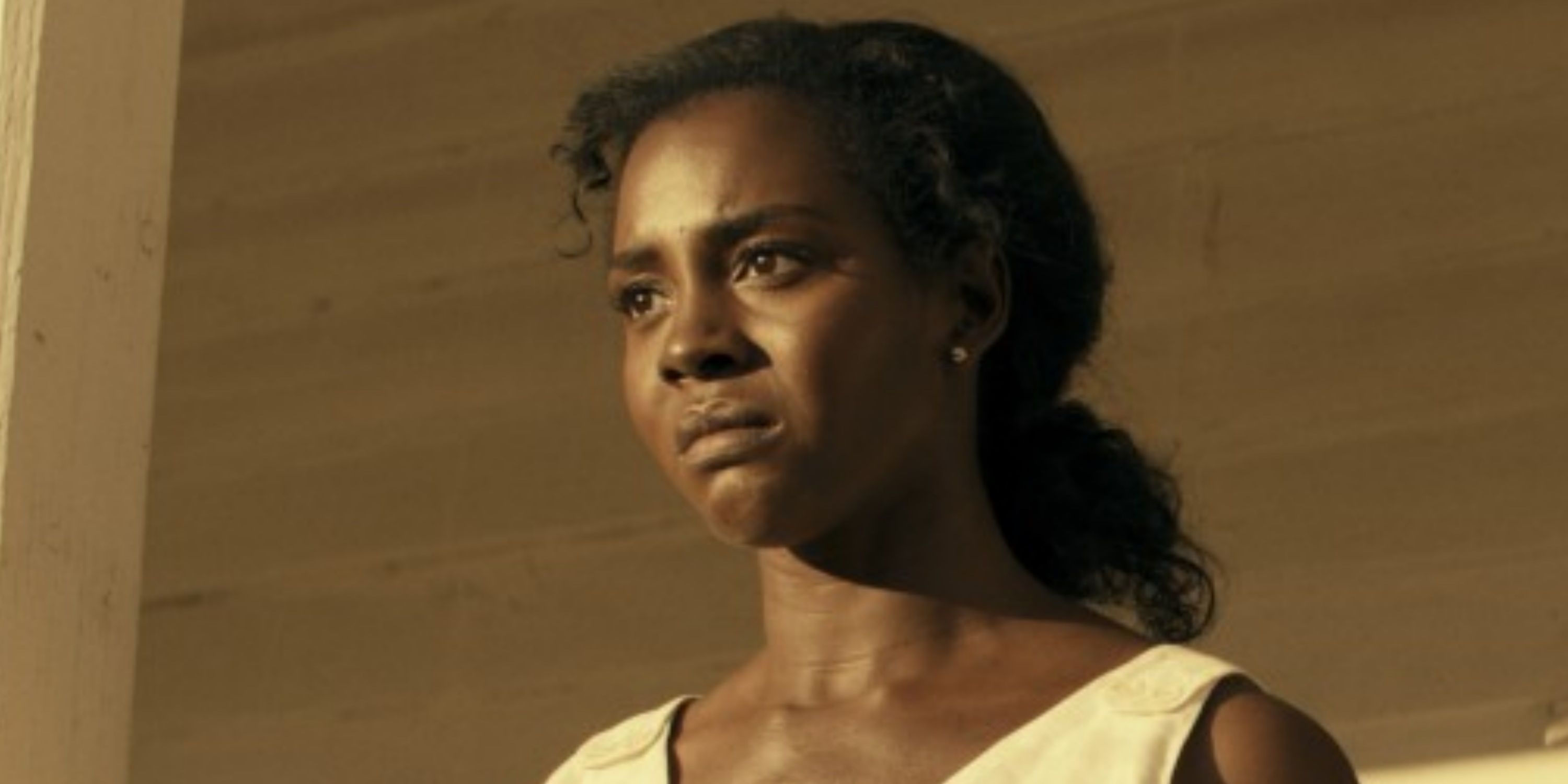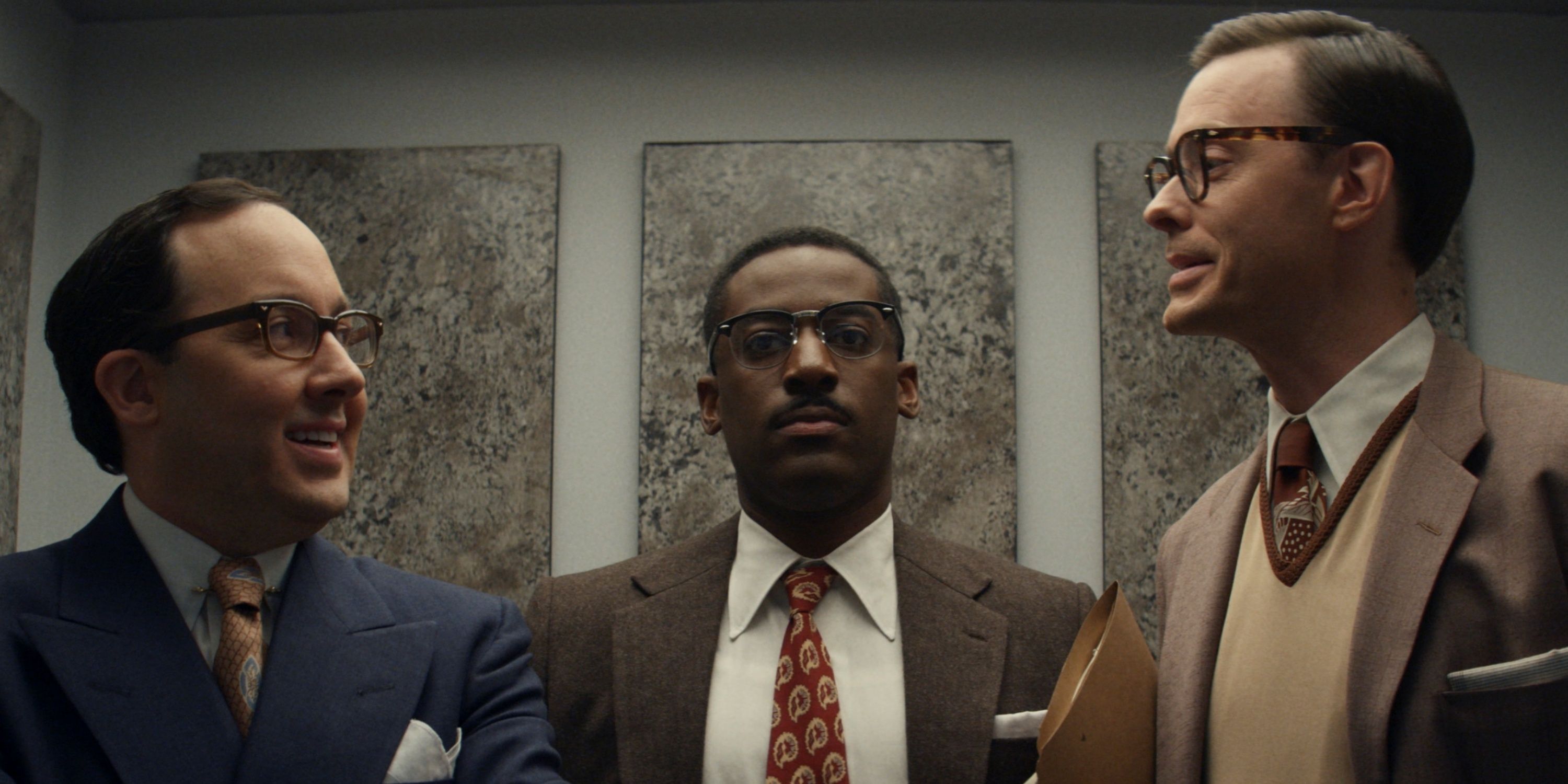From creator Little Marvin, the first season of the Amazon Studios original anthology series Them is set in the 1950s during The Great Migration when a Black family — Lucky (Deborah Ayorinde) and Henry Emory (Ashley Thomas) and their two daughters, Ruby (Shahadi Wright Joseph) and Gracie (Melody Hurd) – move from the South into the all-white neighborhood of Compton. While otherworldly malevolent forces threaten the family, it is their next-door neighbors, who will go to any lengths to protect their way of life as they know it, who are far more dangerous.
During this 1-on-1 phone interview with Collider, writer/executive producer Little Marvin talked about the goal with which he started Them, why he finds horror appealing, whether he’s paid any attention to the Jordan Peele comparisons, why the human component is always more terrifying than the supernatural, watching the Emory family come together, approaching Episode 5, and what would change and what would stay the same, if he gets to continue with future seasons of this anthology series.
Collider: When you sat down to start writing this, what were you hoping for? What did you hope it would turn into? What was your ideal goal?
LITTLE MARVIN: At that point? Honestly, I hadn’t thought that far out. When I sat down to write it, there were no goals, per se, other than really just to honor – honor these families, honor the Black families of the Great Migration, honor the Black families who had attempted to integrate what had formerly been exclusively white communities and were then met with these forms of terror. Seeing these families who doubled down, who stood their ground, who kept their homes — I just found the immensity of bravery in the face of that kind of adversity to be really, really humbling. And so, first and foremost, I just wanted to honor them and make a love letter to them, and let the chips fall where they do.
You said that you started writing this show three years ago, when you were being inundated with videos of Black people being terrorized by the police, and it hasn’t stopped since then. How do you feel what was going on in the world influenced the story you ended up telling and how do you think what’s going on in the world around us now will influence the actual viewing experience?
LITTLE MARVIN: It’s extremely sobering, frankly. It’s a double-edged sword because when you make a story like this, there’s a part of you that secretly hopes you didn’t have to make a story like this. The only reason you’re interrogating these things is because they’re vital and because you must. And so, to have felt that, a few years back, and to have felt, “Wow, this is the time for this story,” and then fast forward three years and be like, “Oh, wow, this is really the time for this story,” it’s sobering. It’s humbling, but if anything, in the strangest of ways, it validates the necessity and the reason why you began that journey to begin with because we must not be silent. Now is the time to be telling these kinds of stories and to interrogate, where do we want to go, as a country? What are we doing?
When did you start to become interested in horror and what is it about horror, as a storytelling device, that you really respond to?
LITTLE MARVIN: I was always that weird kid who was just super into horror, from day one. I would lug a Stephen King hardback around school. I weighed about 85 pounds and the hardback of It weighed about a hundred pounds, and I would lug it around. What I loved about Stephen King in particular, back then, was that for a weird little kid who always felt on the outs, he had this really wonderful ability of putting the outsider on the inside. That’s a thing that horror does quite well, that I’ve always appreciated, whether it’s movies like Carrie, or stories like The Body, which became Stand By Me, or It. I think horror, in general, has this tremendous capability of couching really complex and nuanced social conversations in a package that is palatable. If we had told this exact same story as a straight drama folks may have engaged with it, but it might’ve been a harder pill to swallow. Horror has this way of, because your pulse is pounding and because it’s a thrill ride, it allows you to take viewers on a journey which otherwise might just be a major downer. I liked that, from the beginning. I think about movies like The Night of the Living Dead, which had a Black hero at the heart of that story, or I think about Rosemary’s Baby and the themes of misogyny, or The Exorcist and its themes of faith. Horror has always grappled with really super complex themes in really unique ways.
What do you make of the inevitable Jordan Peele comparisons? Did you think about that, at all?
LITTLE MARVIN: To be honest with you, no, I did not think about it as I was making the show. It was not until I was told there is a thing called Twitter, which I do not engage with and I’m not on, but I was told there’s a lot of talk happening over there. That just validated for me why I’m not on Twitter.
But no, I hadn’t because honestly, with all of the influences that influenced our show, none of them were contemporary. They were all very much from the ‘60s and the ‘70s. We set out to make a show about the ‘50s that felt like it was shot through the lens of the ‘70s. All of the movies that I referenced, from Rosemary’s Baby to The Exorcist to The Shining to Don’t Look Now, were really the only things we were thinking about as we created it. So, to come out on the other end and have folks go, “Well, this is like Us,” I’m like, “Is it?” Because that was not in the reference book when we were sitting down to make it.
What’s been validating is that there was a lot of hubbub about that, but as more and more folks begin to actually engage with the show and see the show, those comparisons become less and less and less. My hope is that people just come to it with an open mind and hopefully are pleasantly surprised by how different all of these things are. For me, what it does is point out the need for many, many, many, many more of us in the sandbox. The fact is that about 120 stories come out a day with white folks at the center of them, and they’re basically interchangeable in my mind, but these kinds of comparisons are never made. Three or four black things come out and for years it’s like, “These are all the same.” My hope is that we just keep making that sandbox wider, so those sorts of comparisons get made less and less and less.
Do you feel like the idea of who “them” is changed from the first episode to the last, and do you feel like the title directly challenges us to confront who we think of as “us” and who we don’t?
LITTLE MARVIN: Yes, and you actually put it more eloquently than I probably could. On any given day, and I’m not being cagey about it, my mind shifts on who exactly the "them" is, and that was always the point. Black folks will come to it with a very specific opinion about who that them is and you may be surprised, but white folks’ opinion of it will differ. I think that ambiguity is important and what people bring to that word is important. There are no wrong answers. That’s not me being cagey. There’s truly no wrong answer to who the "them" of the title is.
This really is a story that’s less about otherworldly malevolent forces and more about the danger that’s right next door, which personally I find way more terrifying.
LITTLE MARVIN: Yep, same.
How did you approach striking a balance between the supernatural stuff and the non-supernatural stuff, and just the regular old racist stuff that is in this?
LITTLE MARVIN: The garden variety racism? We didn’t try to strike a balance, per se. In the writers’ room, we had this mantra, which was "What scares us most is that thing down in the basement that we can’t explain, that sound, or that neighbor down at the end of the block that has been staring at the house way longer than they should be." In my experience, it’s always that neighbor. I find humans to be infinitely creepy and complex and, in some ways, horrifying. That human component, to me, was always in the lead. I wanted all of the horrors to come from that very human place, and then let those more supernatural components be born from there.
At what point in the process did you decide that this was an anthology series and not an ongoing continuing story?
LITTLE MARVIN: From the original pitch, I went in knowing that’s what I wanted to do. Personally speaking, I’m a huge fan of anthologies, since I was a kid. I love the fact that you’re one and done. You get to come in for 10 episodes and just transport someone to another world, and then come back the next season with an entirely new story. So, really, truly from day one, it was pitched as an anthology.
How do you want a Season 2 to look and feel different from Season 1? Have you thought about that and whether or not you would have an entirely different cast?
LITTLE MARVIN: I have thought about it. What I can say about it is that the people and the place and the time period will shift, every season. The thing that will remain the same is that folks who have been marginalized from history will always be front and center, in their own story of American terror. At the same time, folks who have largely been marginalized from the center of the frame in these genre exercises that I’ve loved since I was a kid are always going to occupy the center of the frame. That’s the thing that will be the same. The rest of the things may surprise.
From the first episode, you get the sense that something really bad happened to this family. By the time we get to Episode 5 and we actually see what happened, it’s a lot to take. How did you approach figuring out what you wanted that episode to be and how much you would actually show?
LITTLE MARVIN: How much we would actually show was always of utmost importance. I’m a big believer that what’s inferred is always scarier than what’s overtly shown. That’s just from a horror buff and a film buff perspective. For that particular scene, it wasn’t really that strategic, in the sense that it came full bore from a nightmare, which I think most horror writing does. It gets trapped somewhere in the subconscious, and when you unearth it, you either use it or you don’t. I was terrified of that scene, for quite some time, and didn’t want to confront it. But it was actually because of that feeling that I felt like I had to interrogate it because there was something in it that I’d never felt before, when sitting down to write. Without being able to articulate it, at the time that I was writing it, we truly did want the crime at the heart of this story to wrestle with a history of violence against Black folks in this country. That was the origin of that scene.
What was it like to then present that to Deborah Ayorinde? Were there a lot of conversations about that episode with her and what she would have to do in it?
LITTLE MARVIN: There were. The thing about Deborah is the trust that she put in me, particularly, but also in the show and in the character was so apparent, from day one. We had each other’s backs, from day one, and we had to go into it with that. And that extends out to Janicza Bravo, who I have to call out for being our fantastic director of that episode and who really created a network of trust and love around Deborah, around the cast and around the crew, in the making of that particular episode. We said, from the beginning, that we wanted to create a super safe space for super dangerous things to happen. Those kinds of things can’t happen, if you’re also feeling anxious about it. It was super important that everyone, and particularly Deborah, felt held in that moment.
Your cast in this is really fantastic, but I was most impressed with the two young actresses that play the daughters because so much is asked of them and they really deliver, on every level. What were you looking for, with those roles, and how did you know when you found it?
LITTLE MARVIN: This was my first show and you’re given a lot of advice by a lot of people. One of the things you’re always told is, “Do not write super hard roles for kids. It’s going to be so hard. You’re going to hate that you made that decision.” That’s what everybody was saying. I was like, “There is no world where Gracie Jean and Ruby Lee do not exist in this show. That’s not happening. We’re going to find them.” We held hands on that, and hoped and prayed. You get tape after tape after tape, and then suddenly, these two tapes came in. I really kid you not, in both instances, I cried watching their tapes. There was a dream of those two girls, and then these two walked in and it was so far beyond what I had dreamed. Shahadi [Wright Joseph] has this tremendous ability to just slay your heart without even any words. You could point the camera at Shahadi and she’d make you feel something. It was great. And then, similarly, Melody [Hurd] is such a little trooper. She came in and did these super terrifying scenes and I was like, “Is she okay?,” and then I’d turn around and she’d be doing a TikTok dance, right after the scene. They’re just pros, in every way.
Were you ever worried about the effects that this entire experience might have on them?
LITTLE MARVIN: Of course, and on everybody, frankly. There were many, many challenging moments that were challenging for the Black folks and challenging for the white folks. We created a safety net where people felt held. What was lovely, especially with the girls, was to see how they looked up to Deborah and Ashley [Thomas]. Nothing would warm my cold, dead heart more than walking around and seeing them at craft services together, eating as a family, or I’d see Ashley walking with his arm around Shahadi. These kids looked up to them. I’m really glad that we cast these four because it was literally like watching a family, before your eyes.
There’s so much identifiably racist imagery in this show, in the behavior and the language and everything from the N-word to the ape comparisons to the man in Blackface. Was there anything that you found most difficult to deal with or to watch be brought to life on set, just on a personal level?
LITTLE MARVIN: Honestly, it was the aggregate. It was all of it. The thing that really would get to me, on those days where I would see this imagery, is that you don’t have to think back more than a couple of decades about how it would have felt to be in this time and to be confronted with such bald-faced hate, at all times. It got me thinking about how we’re living now in a time where we’re just beginning to have language for these things. This is going to sound very trite, but even the word Karen and the fact that word exists is a major gift to Black folks. There has never been a way to articulate a kind of behavior that has plagued us for a long amount of time. And I would think about how would that have felt, 60 or 70 years ago, to not only not have the language to articulate a thing that’s happening to you, but also even if you could articulate it, you don’t have the right. That was the thing that was sobering, the entire time.
Whatever experience the audience has with this and however you feel about it by the time you get to the end of the season, the fact that you had a definite vision is undeniable. How do you then break that expectation for the next thing that you want to do that isn’t Them?
LITTLE MARVIN: I guess first by not thinking at all about expectations. Just as I never could have imagined this journey, frankly, when I sat down to write, by myself in my bedroom, it’s just key to stay in that space and know that every time it’s going to feel different and every time it’s going to be incredibly challenging because that’s just television and it’s par for the course. It’s about staying focused on writing that love letter. That gets you through on the days when you’re scared, which is every day. Basically, you’re always scared.
Are you someone who has a stack or a file of a bunch of other projects that you have in various stages of development, or are you someone who prefers to focus on one thing at a time?
LITTLE MARVIN: You always have your things. There are many, many things floating around. But when I’m working, I like to very much focus on the thing at hand. In general, that level of specificity is really necessary. I think audiences can feel that. Whether you like it or not, we worked on every single frame of this show in an incredibly intentional way. I actually don’t have the ability to be like, “Well, if people hate it, I can say I didn’t do that,” because I did. We really were intentional about it. So, I think focusing on the thing at hand is key.
What did you learn and take away from the experience of also having somebody like Lena Waite as a sounding board through all of this?
LITTLE MARVIN: It was everything. She is what you imagine her to being. She is a champion of art. She’s a champion of new artists. She’s a champion of Black artists. She’s a champion of queer artists. I’m all of those things and I felt held by her, from day one. It honestly made me braver because she’s very brave and I tend to be a little bit more skittish. That bravery just gave me permission to be more brave. Her kicking the door open for me to walk in is now an inspiration that I’m going to take for the rest of my career. Now I’m going to go and open the next door for the next wave of folks who haven’t had a shot, to come in. It’s really, truly an inspiration.
Them is available to stream at Amazon Prime Video.




